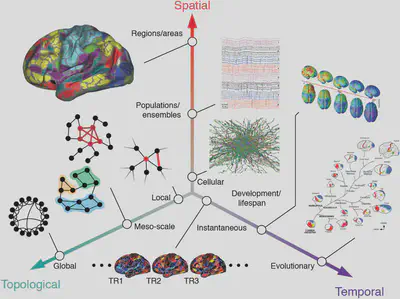Neural Network Development
The human brain is a complex system displaying intricate, dynamic functions. In a multidisciplinary effort, the recent application of tools from network science to characterize the interconnected nature of the brain has enabled a tremendous advance in our understanding of cognition. We are interested in developing and applying extensions of these tools to define and characterize the role of cognitive systems in the larger scale brain network, and to map how these roles change during adolescent development, providing an important context for understanding psychopathology.

The brain network is mathematically represented as a static graph $\mathcal{G}=(V,E)$ where $V$ is the set of nodes, typically
the brain regions defined through atlas or ICAs, and $E$ is the edges linking different regions in $V$, or a dynamic graph sequence
$\mathcal{G}=(V,\mathcal{E})$, where $\mathcal{E}={E_i}$ is a collection of sequential edges. Based on such kind of
construction, we can further apply the complex system theory to investigate the topological variation of brain’s structural and functional
connectome, characterizing co-morbidity that suggests dimensional circuit-level abnormalities that cross diagnoses and mechanistic principles
that support the matureness of human’s cognitive ability.